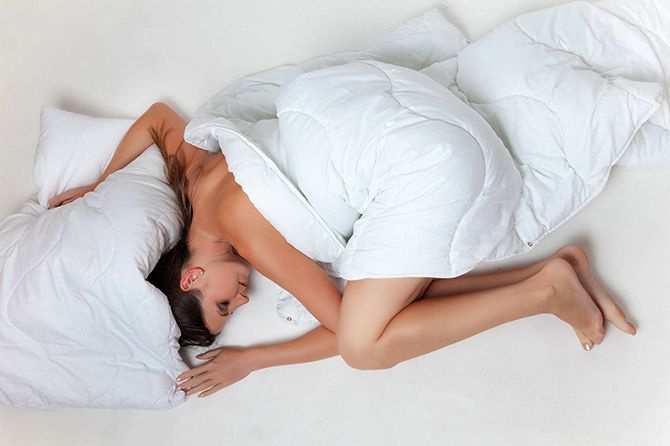You could be suffering from sleep paralysis, says Dr Lancelot Mark Pinto.

The girl who was afraid to sleep
Ann (name changed), a 24-year-old software engineer, consulted me a year ago.
When she walked through my clinic door with her mother, I saw an anxious, fatigued girl.
Even before she could start speaking, it was clear she had little hope of being heard. She had a 'Why should I even bother telling you what I'm going through when I know you will think I'm crazy' look on her face.
Yet, after being prodded by her mother, she told me she was terrified of falling asleep.
Almost every single night, especially at the start of the night, she would wake up with a sense of impending doom.
She would have a clear awareness of her surroundings, with a feeling of a weight placed on her chest and an inability to move any part of her body to overcome or resist the feeling.
She would feel suffocated, would break out into a cold sweat and feel overwhelmed by the helplessness of her situation.
She would feel a presence in her room, but would be unable to clearly define its shape or form.
She would sometimes start screaming hysterically until she was eventually calmed by her parents, who would rush at the sound of her screams.
These were the 'good' nights; the 'bad' ones were where she would want to, but be unable to, scream or sometimes even open her eyes.
These episodes, according to her mother, would typically last a couple of minutes but, to Ann, they seemed like they went on forever.
What is sleep paralysis?
Sleep paralysis has been defined by the International Classification of Sleep Disorders as 'a disturbing temporary inability to perform voluntary movements at sleep-wake transitions.'
'Despite being awake and conscious of the sleeping environment, it is impossible for subjects to move their limbs or even open their eyes. The experience can last for several minutes. Other symptoms can include blurred vision and double vision.'
Hallucinations can accompany the paralysis in 25 to 75 per cent of such episodes.
When hallucinations occur, three themes appear common: Intruder hallucinations (sense of an evil or malevolent presence in the room), incubus hallucinations (feeling suffocated or choked) and vestibular hallucinations (out-of-body or floating experiences).
Why does sleep paralysis occur?
Sleep is divided into the lighter, non-rapid eye-movement sleep and the deeper REM sleep.
REM sleep, the stage in which dreams occur, is characterised by a complete paralysis of the voluntary muscles of the body, which prevents an individual from acting out one's dreams and harming oneself.
Sleep paralysis is thought to occur due to a REM-intrusion into wakefulness, ie the body is still in REM sleep while the brain has woken up.
How common is sleep paralysis?
The prevalence of sleep paralysis in India is unknown, as sleep medicine is an under-researched faculty here.
Most international studies have reported that around 8 to 10 per cent of the general population reports at least one episode of sleep paralysis in their lifetime.
This prevalence appears to be higher among students and those with psychiatric illness (anxiety disorder, panic disorder, post-traumatic stress disorder), possibly reflecting the contribution of sleep deprivation in the former and sleep disorders in the latter group of individuals.
Stressful life events, shift-work and jetlag are other factors that have been associated with sleep paralysis, while a rarer condition called narcolepsy needs to be looked for in individuals who frequently suffer such episodes.
How does one diagnose the cause?
As sleep paralysis is not recognised among individuals as a genuine symptom, and most physicians are not aware about this illness, those who suffer from the condition often seek a paranormal explanation and end up attempting to find spiritual cures.
I have had patients who have had their houses blessed by holy men and cleansing rituals and 'exorcisms' performed on them before they began seeking medical help.
A detailed sleep history is the first step in identifying the potential cause of recurrent sleep paralysis, as poor sleep hygiene, sleep deprivation and frequent awakenings are often the commonest association.
In young adults, ensuring an adequate duration of sleep with a regular schedule, limiting exposures to bright lights (including back-lit devices such as mobile phones) and avoiding caffeine is the first step.
Screening for, and diagnosing, underlying psychiatric causes is important, as is identifying stressors (psychological and/or sexual abuse has been associated with the condition).
Narcolepsy is a rare disorder associated with excessive sleepiness during the day, including 'sleep attacks', cataplexy (loss of balance/falls during periods of emotional excitement) and is often associated with recurrent episodes of sleep paralysis.
Back to the girl who was afraid to sleep
On enquiry, Ann told me that she had injured herself on more than one occasion as a consequence of 'her knees giving way' during episodes of intense laughter or crying.
Her friends told her that she often 'phased out' during conversations, but she had no recollection of these episodes after they took place.
She had a regular sleep schedule and did not appear to have any underlying stressors or signs of a psychiatric illness.
My clinical diagnosis was that of narcolepsy and further studies (which included actigraphy, a polysomnography and a multiple sleep latency test) confirmed the diagnosis.
I prescribed a stimulant medication and worked with her employer to schedule short daytime naps.
She improved significantly with treatment.
How does one treat sleep paralysis?
Unlike Ann, most individuals with sleep paralysis will have simpler, commoner causes.
Reassuring the individual that these episodes are innocuous, emphasising the need for a regular sleep schedule and treatment of any underlying anxiety is often all that is needed.
During the episode, trying to focus on moving the distal parts of the body such as fingers and toes, rather than the entire body, has been found to help.
Sleeping on one's side, rather than one's back, has been associated with a reduction in frequency of episodes.
Keeping a pleasant picture on the ceiling and walls to focus on during the episodes can also help, with the repeated reassurance that these episodes pass away in a few minutes.
The first step, however, to help individuals with what seems to be a relatively common condition, is to spread awareness about the condition and to encourage individuals to seek professional help for sleep paralysis, especially if the episodes are recurrent.
Dr Lancelot Mark Pinto is a consultant respirologist at Hinduja Hospital, Mumbai. He is a Fellow (sleep medicine and COPD rehabilitation) at McGill University, Canada.











